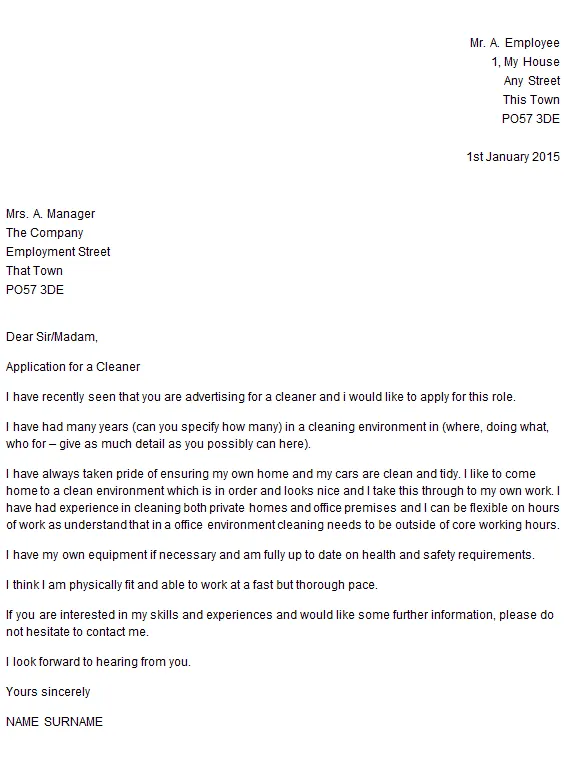Why a Cover Letter Matters for a Cleaner Position
In the competitive job market, especially for positions like cleaning roles, a well-crafted cover letter can make all the difference. While a resume provides a snapshot of your experience and skills, a cover letter allows you to elaborate on these points and demonstrate your enthusiasm for the specific opportunity. It provides a valuable opportunity to showcase your personality, highlighting what makes you a strong candidate beyond the basic requirements listed in the job description. A cover letter is your chance to make a positive first impression and set yourself apart from other applicants. By addressing the hiring manager directly and demonstrating your understanding of the company’s needs, you significantly increase your chances of landing an interview.
Highlighting Your Cleaning Skills
When applying for a cleaner position, your cleaning skills are paramount. Your cover letter should clearly and concisely outline your proficiency in various cleaning tasks. Start by listing your core skills, such as dusting, vacuuming, mopping, and sanitizing. Go beyond the basics, and include any specialized skills you possess, like window cleaning, floor waxing, or experience with specific cleaning products. Quantify your experience whenever possible; for example, mention the size of the spaces you’ve cleaned, the frequency of your cleaning duties, or the types of surfaces you’ve worked with. This specific approach immediately demonstrates your suitability for the job.
Detailing Cleaning Experience
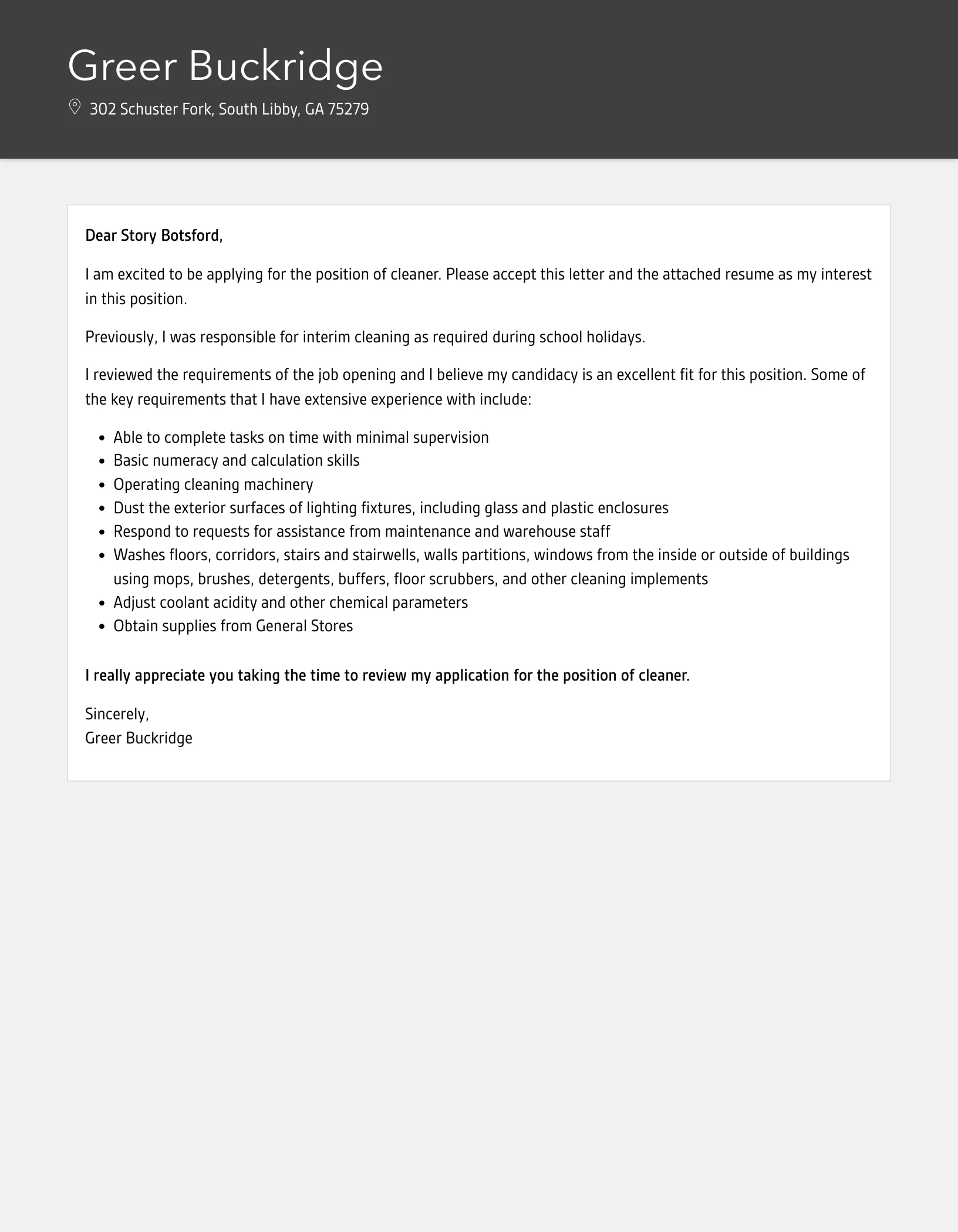
Provide specific examples of your cleaning experience, highlighting the settings you’ve worked in, such as residential homes, offices, or commercial buildings. Briefly describe your responsibilities in each role, focusing on the key duties and accomplishments. For instance, if you have experience cleaning multiple rooms in a short time frame, mention your efficiency. If you have experience with deep cleaning, state how you manage it to a high standard. Include any awards or commendations you’ve received for your cleaning performance. Mention any special circumstances you’ve handled, such as dealing with sensitive materials or handling cleaning tasks during business hours, demonstrating your versatility.
Mentioning Specific Cleaning Tools and Methods
Employers want to know that you’re familiar with the tools and methods relevant to their cleaning needs. In your cover letter, specify the cleaning equipment and products you are comfortable using. List items like vacuum cleaners, mops, brooms, cleaning solutions, and any specialized equipment. If you have experience using specific brands or types of equipment, include those details. Describe your knowledge of various cleaning methods, such as surface disinfection, stain removal techniques, and environmentally friendly cleaning practices. Showing familiarity with a range of cleaning methods and tools directly demonstrates your competence and practical suitability for the role.
Tailoring Your Cover Letter to the Job Description
One of the most critical steps in writing a successful cover letter is customizing it to the specific job description. Carefully review the job posting and identify the key skills, experiences, and qualifications the employer is seeking. Align your cover letter content with these requirements, using the same keywords and phrases. Focus on how your qualifications match the employer’s needs, providing relevant examples to support your claims. If the job description emphasizes a particular skill or responsibility, dedicate a section to addressing it directly. By tailoring your cover letter, you demonstrate to the hiring manager that you understand the role’s requirements and possess the specific attributes the employer is looking for.
Researching the Company and Showing Interest
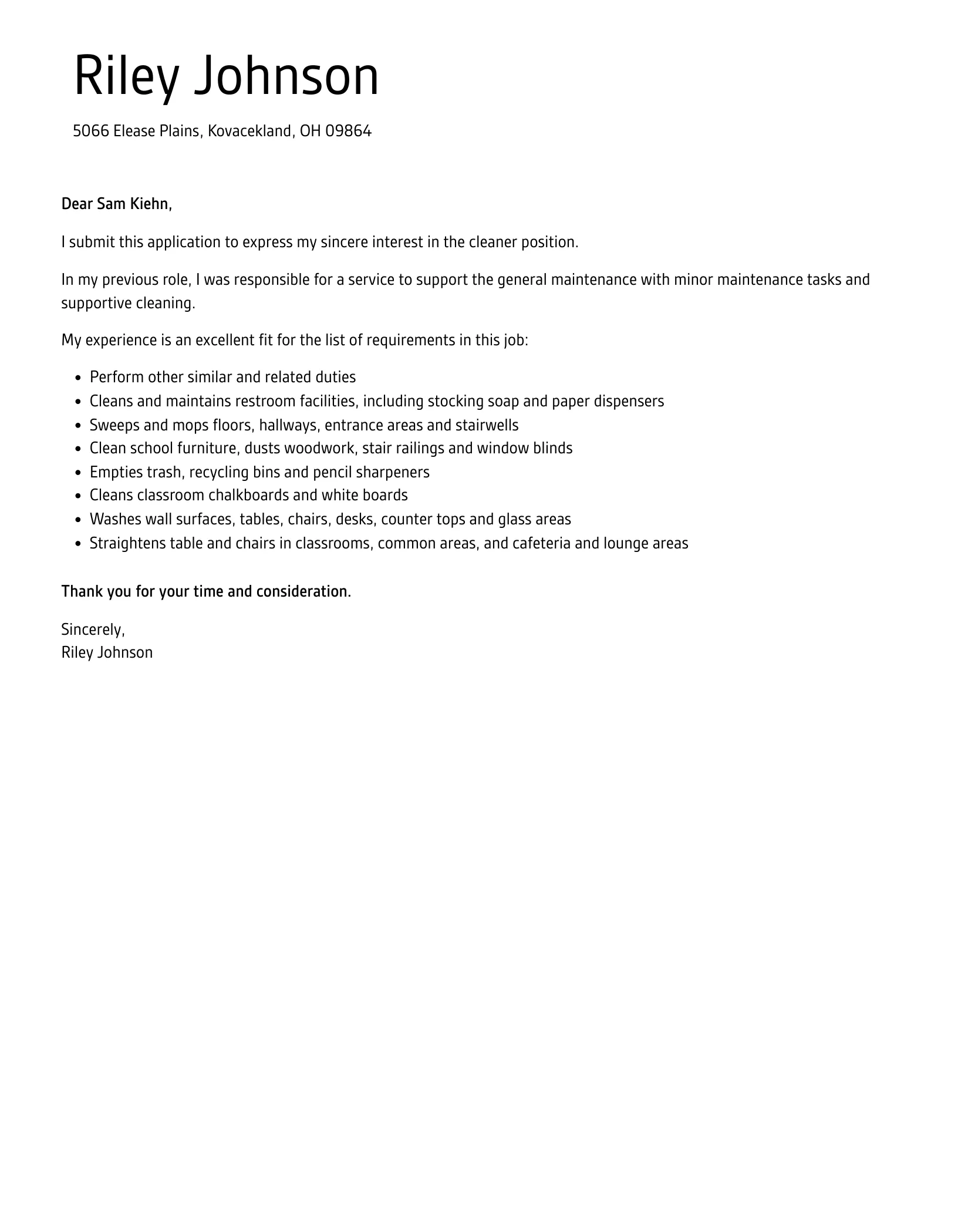
Before writing your cover letter, take time to research the company. Visit their website, read about their mission, values, and any recent news or projects. Demonstrate genuine interest in the company by referencing specific details in your cover letter. Mention the company’s reputation, their approach to customer service, or any aspects of their work that appeal to you. By showing that you have taken the time to learn about the company, you’re making the case that you’re truly interested in the position and that you are not just submitting a generic application.
Addressing the Hiring Manager Directly
When possible, address your cover letter to a specific person, the hiring manager. Find their name on the company website, LinkedIn, or the job posting itself. If you can’t find a name, use a professional greeting like “Dear Hiring Manager.” Using a personal greeting creates a more engaging and personalized tone, which can make a positive impression from the start. It shows that you have put in extra effort and are paying attention to detail. If you’re unsure of the hiring manager’s name, you can research the company’s staff or contact the company directly to ask.
Emphasizing Relevant Skills
In addition to highlighting your cleaning skills, be sure to emphasize any additional skills or qualifications that align with the job requirements. This could include skills such as time management, attention to detail, and the ability to work independently. If the job requires specific certifications or training, list these credentials prominently. If the role involves customer interaction, mention your experience in providing excellent service. Frame your skills around the needs of the role and the requirements laid out in the job description. By focusing on relevant skills, you demonstrate your overall suitability and increase your chances of being selected for an interview.
Showcasing Soft Skills
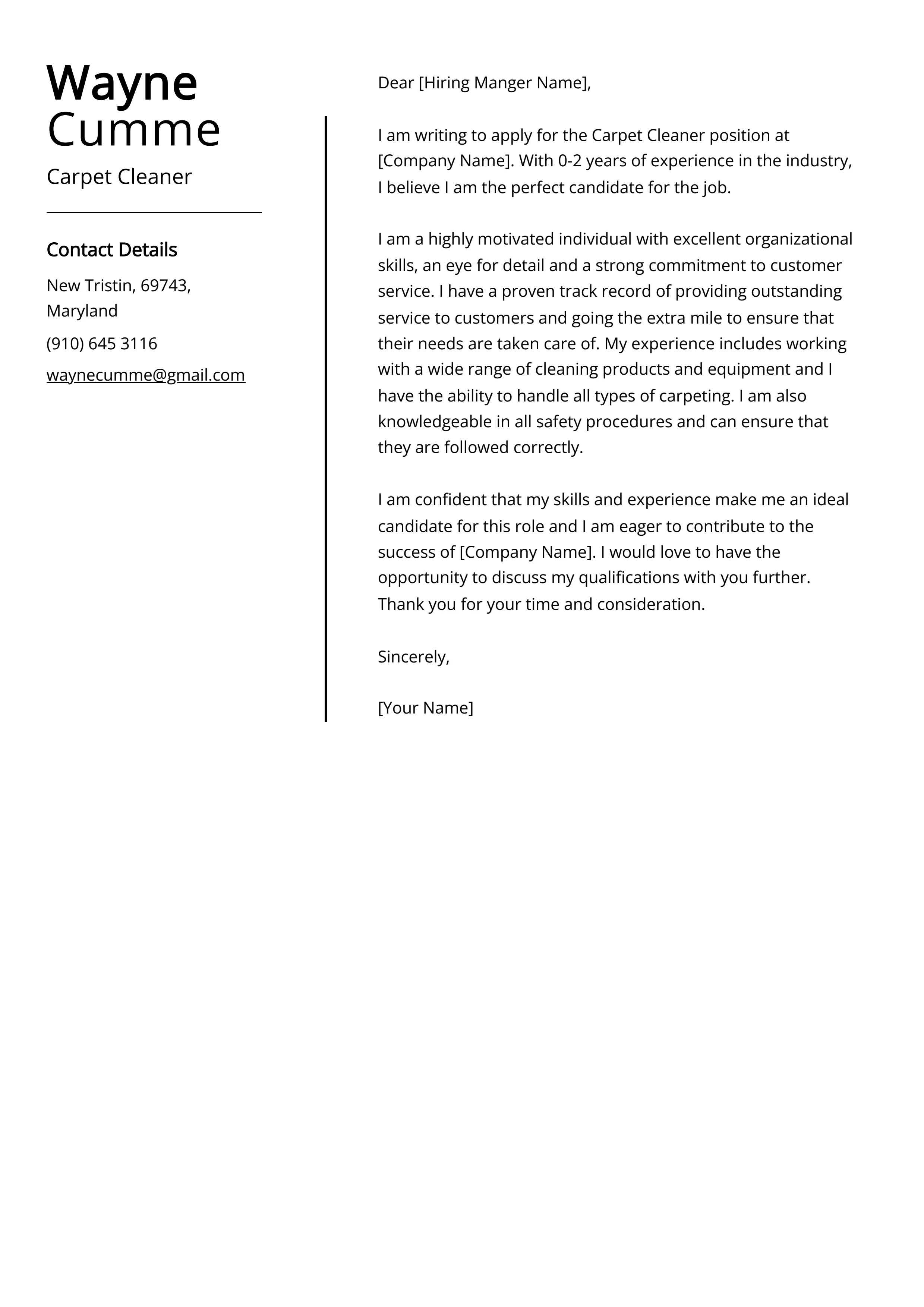
While technical skills are important, soft skills are equally essential for a cleaning position. Soft skills encompass your interpersonal and professional capabilities, such as reliability, teamwork, and communication. Highlight these skills in your cover letter by providing examples. For example, mention how you have worked well with colleagues in past roles. Explain how you have handled difficult situations with professionalism. Show how your ability to follow instructions and take initiative sets you apart from other applicants. Presenting your soft skills paints a picture of a well-rounded candidate who is not only capable of performing cleaning tasks but also contributing positively to the work environment.
Demonstrating Reliability and Punctuality
Reliability and punctuality are vital attributes for a cleaner. In your cover letter, be sure to explicitly state your commitment to these qualities. You can mention specific examples of how you have consistently arrived on time for work and completed your tasks efficiently. Emphasize your dependability, and the assurance you offer in fulfilling your duties consistently. Highlighting your focus on these elements will quickly demonstrate your suitability for the position. Mention any steps you take to ensure you maintain a perfect attendance record. Use your cover letter to give potential employers confidence that you will show up, and complete the job at hand.
Highlighting Communication and Teamwork
If the cleaning position requires any amount of customer interaction, be sure to mention your ability to communicate effectively. This includes being courteous and responsive to requests, able to follow directions, and communicate with your colleagues. Provide specific examples of how you have communicated clearly and professionally with clients or coworkers in past cleaning roles. Highlight your ability to work as part of a team, emphasizing any collaboration that leads to success. Focus on the importance of being a good communicator. By demonstrating that you possess both strong communication and teamwork skills, you show your potential to be a valuable asset to any cleaning team.
Writing a Strong Call to Action
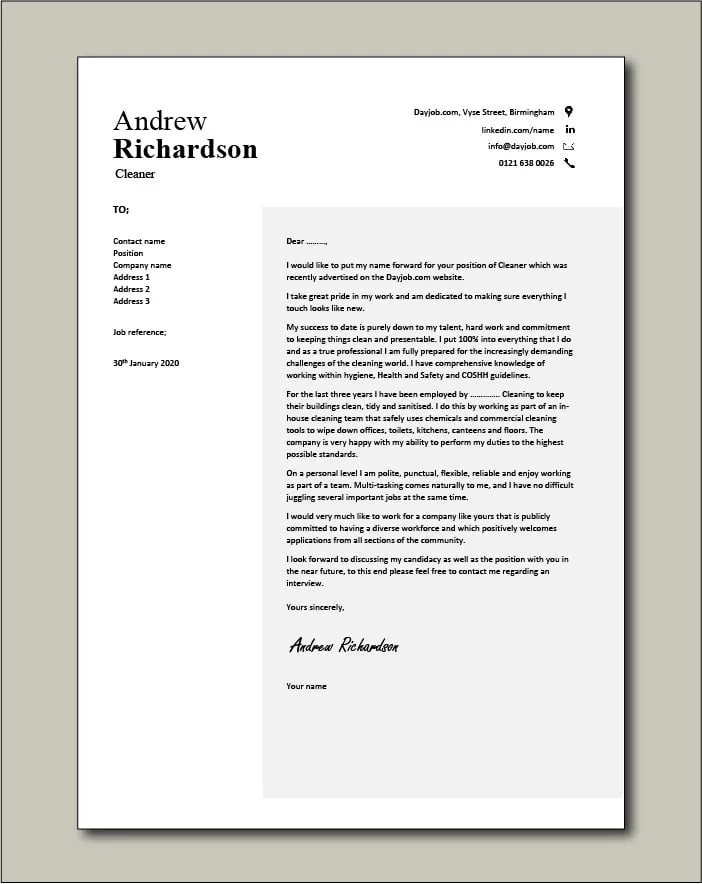
Conclude your cover letter with a strong call to action. Clearly state your interest in the position and your availability for an interview. Express your enthusiasm for the opportunity to discuss your qualifications further. Include your contact information in a clear and accessible manner. Be direct and proactive in your call to action. Avoid vague phrases such as “I look forward to hearing from you.” Instead, express your desire to speak with the hiring manager soon. Using a strong call to action not only demonstrates your interest but also encourages the reader to take the next step in the hiring process.
Expressing Enthusiasm for the Position
Expressing genuine enthusiasm for the position is key to a successful cover letter. In your closing paragraph, reiterate your excitement about the opportunity to work for the company. Mention something specific that appeals to you about the role or the company itself. Show your eagerness to contribute your skills and experience. A sincere expression of interest can make a lasting impression, making you memorable to the hiring manager. By ending on a positive note, you leave the reader with a favorable view of your candidacy and encourage them to consider your application more thoroughly.
Providing Contact Information
Ensure that you provide your contact information at the end of your cover letter, including your phone number and email address. Make sure your email address is professional and easy to read. It’s also advisable to list your contact information at the beginning of the cover letter and your resume to make it readily accessible. Providing accurate and up-to-date contact details makes it easy for the hiring manager to reach you. Double-check your information to make sure there are no errors. Making it simple for the employer to contact you can significantly increase your chances of getting an interview.
Proofreading and Formatting Your Cover Letter
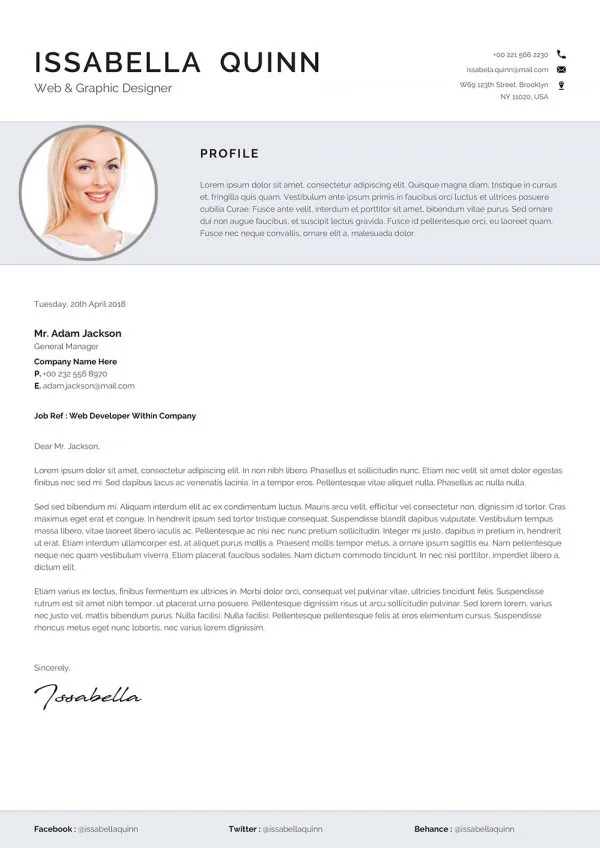
Proofreading and formatting your cover letter is critical to ensure it’s polished and professional. Before submitting your application, carefully proofread your letter for any grammatical errors, spelling mistakes, or typos. Consider using a grammar checking tool to assist you. Make sure the tone is formal, and the language is clear and easy to understand. Incorrectly formatted or poorly written cover letters can immediately disqualify an application. Therefore, taking the time to ensure your cover letter is error-free can significantly improve your chances of success.
Checking for Grammatical Errors and Typos
Thoroughly check your cover letter for grammatical errors and typos. These errors can be distracting and make a negative impression on the hiring manager. Review your letter multiple times, or have a friend or family member read it over to catch any mistakes you might have missed. Pay attention to punctuation, capitalization, and sentence structure. Proofreading is one of the easiest and most impactful steps you can take to improve the quality of your application. Even small errors can suggest a lack of attention to detail and professionalism.
Formatting for Readability
Ensure that your cover letter is easy to read by formatting it effectively. Use a clear, professional font, such as Arial or Times New Roman, and maintain a consistent font size. Use proper spacing, and break up your text into paragraphs to make it more visually appealing. Keep your sentences and paragraphs concise and to the point. Avoid overcrowding the page, and use bullet points or lists to highlight key skills or experiences. A well-formatted cover letter is more likely to capture the reader’s attention. By making your letter easy to read, you increase the chances that the hiring manager will absorb all of your information.
